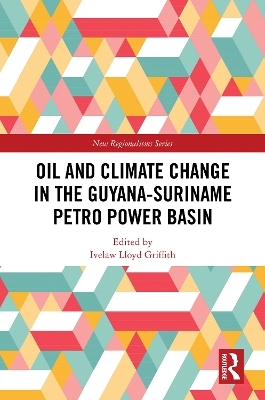
Oil and Climate Change in the Guyana-Suriname Basin
Routledge (Verlag)
978-1-032-59893-2 (ISBN)
Ivelaw Lloyd Griffith is a Fellow with the Caribbean Policy Consortium and Global Americans and a Senior Associate with the Center for Strategic and International Studies. He has published widely on Caribbean security and crime issues, the latest book being Challenged Sovereignty: The Impact of Drugs, Crime, Terrorism, and Cyber Threats (University of Illinois Press, 2024). Recipient of the Dr William J. Perry Award for Excellence in Security and Defense Education, named in honor of former U.S. Defense Secretary, Ivelaw has served in several academic leadership roles, including as Vice-Chancellor of the University of Guyana, President of Fort Valley State University, Provost of universities in Virginia and New York, and as a Dean at Florida International University. Also, he has testified before the U.S. Congress and served as a consultant to the U.S. State Department, the Commonwealth Secretariat, Canada’s Ministry of Foreign Affairs and International Trade, and several other agencies. As well, he has been a visiting scholar at the Perry Center for Hemispheric Defense Studies in Washington, DC, the Royal Military College of Canada, and the George Marshall European Center for Security Studies in Germany.
List of Figures
List of Tables
Preface and Acknowledgements
List of Contributors
Introduction
1. Ivelaw Lloyd Griffith, “Dynamics of Oil and Climate Change”
Part I: Petro Power Geoeconomics and Geopolitics
2. Lorraine Sobers, “Petro Power in the Guyana-Suriname Basin in Global Context”
3. Arthur Deakin, “Global Investment in the Energy and Allied Sectors in the Guyana-Suriname Basin: Actors and Actions”
4. Georges A. Fauriol, “Oil and Security: Geopolitical Implications for the Caribbean of Russia’s Invasion of Ukraine”
5. Riyad Insanally, “Geopolitics of Oil and Territory in the Guyana-Suriname Basin”
6. Patrick Paterson, “Venezuelan Petro Politics and the Impact on Petro Power in Guyana and Suriname”
7. Anthony T. Bryan, “Petro-power Pursuits in the Guyana-Suriname Basin: Lessons from Trinidad and Tobago”
Part II: Petro Power Challenges and Opportunities
8. Barbara G. Reynolds, “Oil and the Domestic Politics Factor in Guyana and Suriname"
9. Vivian M. Williams, “Oil and Legal Dynamics in Guyana and Suriname: Considerations and Contentions”
10. Jack Menke and Daniël Amrish Lachman, “Reflections on Dynamics of the Natural Resource Curse in Guyana and Suriname: Lessons Learnt and Prospects”
11. Leyland Lucas, “The Oil Economy in Guyana and Suriname: Education Challenges and Opportunities”
12. Mavrick Boejoekoe, “Oil and Institutions in Guyana and Suriname: Challenges and Opportunities”
13. Joel Bhagwandin, “Local Content and the Local Business Environment in Guyana”
14. Ulric Trotz, “The Energy-Environment Nexus in Guyana”
Part III: Climate Change and Considerations Beyond Petroleum
15. Ulric Trotz, “Global Climate Change Dynamics: Impacts on the Guyana-Suriname Basin”
16. Ivelaw Lloyd Griffith, “Oil and Wet Neighborhood Dynamics in the Guyana-Suriname Basin”
17. Paulette Bynoe, “Climate Change Mitigation Measures in Guyana and Suriname: a Policy Perspective”
18. Norman Munroe, “Environmental Risks and Mitigation in the Guyana-Suriname Basin”
19. Scott B. MacDonald, “Product Diversification beyond Oil and Gas in the Guyana-Suriname Basin”
20. Keron Niles and Alicia Elias-Roberts, “Beyond Fossil Fuels: Alternative Energy Prospects in Guyana and Suriname”
Index
| Erscheinungsdatum | 03.05.2024 |
|---|---|
| Reihe/Serie | New Regionalisms Series |
| Zusatzinfo | 7 Tables, black and white; 21 Line drawings, black and white; 21 Illustrations, black and white |
| Verlagsort | London |
| Sprache | englisch |
| Maße | 156 x 234 mm |
| Gewicht | 453 g |
| Themenwelt | Naturwissenschaften ► Biologie ► Ökologie / Naturschutz |
| Naturwissenschaften ► Geowissenschaften ► Geografie / Kartografie | |
| Sozialwissenschaften ► Politik / Verwaltung | |
| Sozialwissenschaften ► Soziologie ► Spezielle Soziologien | |
| Wirtschaft ► Volkswirtschaftslehre ► Wirtschaftspolitik | |
| ISBN-10 | 1-032-59893-X / 103259893X |
| ISBN-13 | 978-1-032-59893-2 / 9781032598932 |
| Zustand | Neuware |
| Haben Sie eine Frage zum Produkt? |
aus dem Bereich


